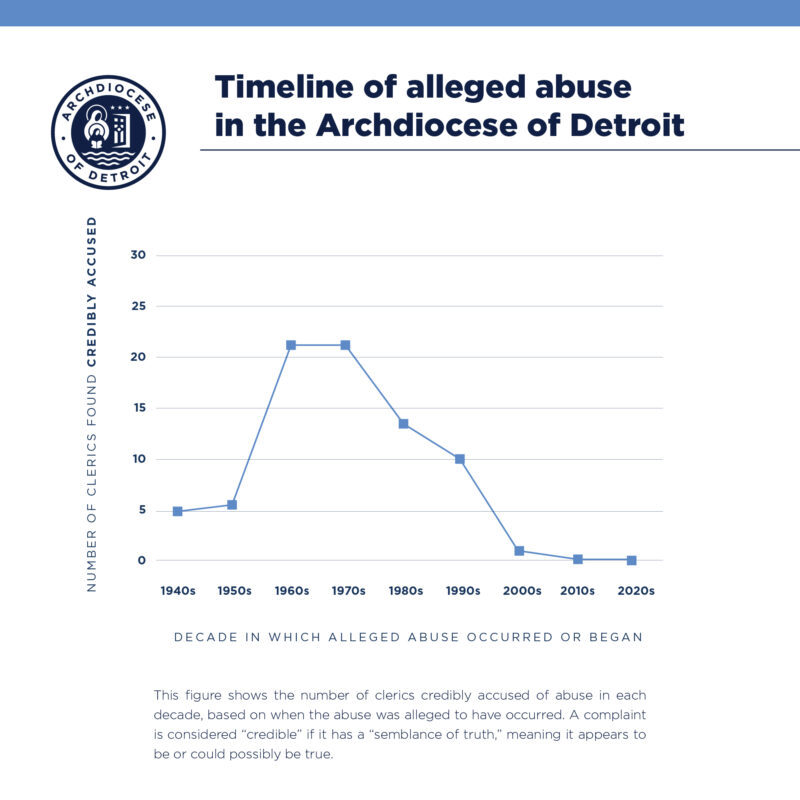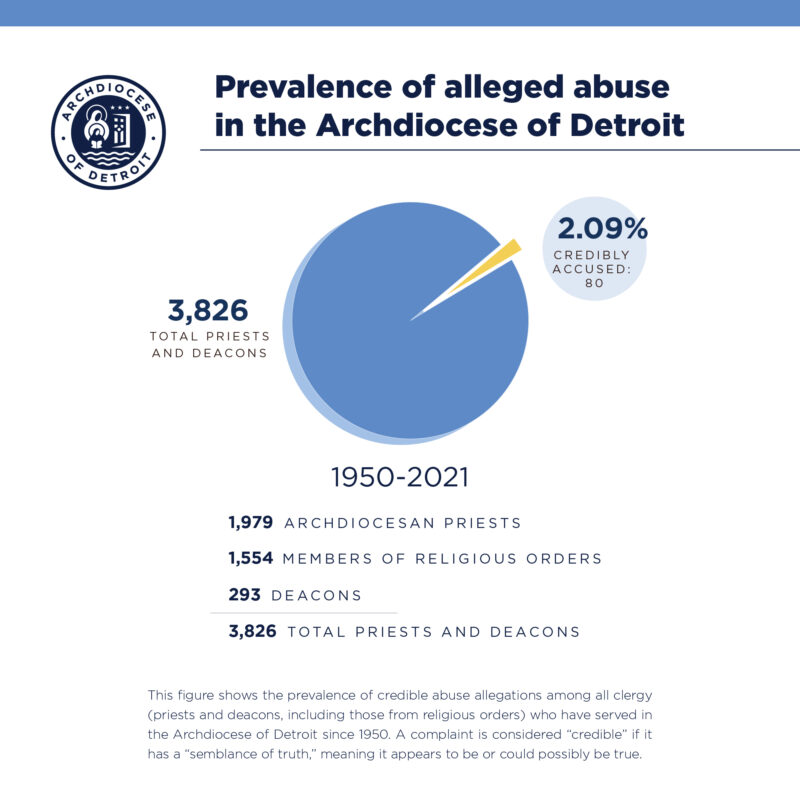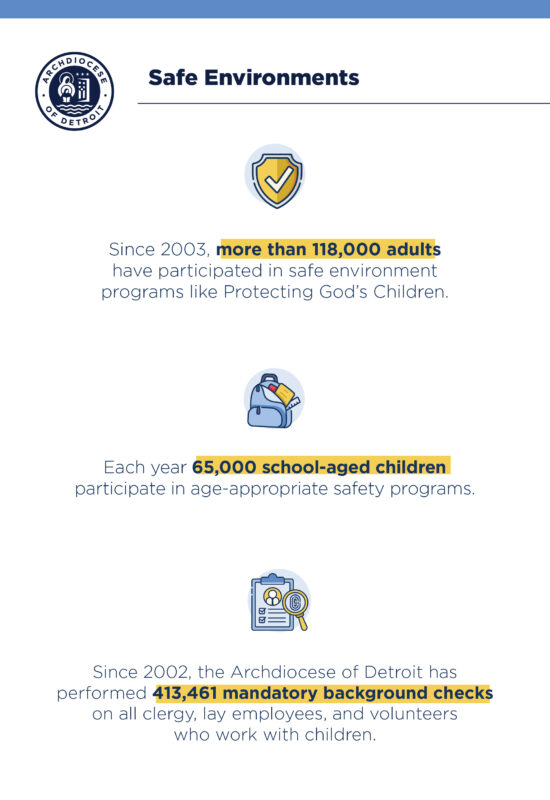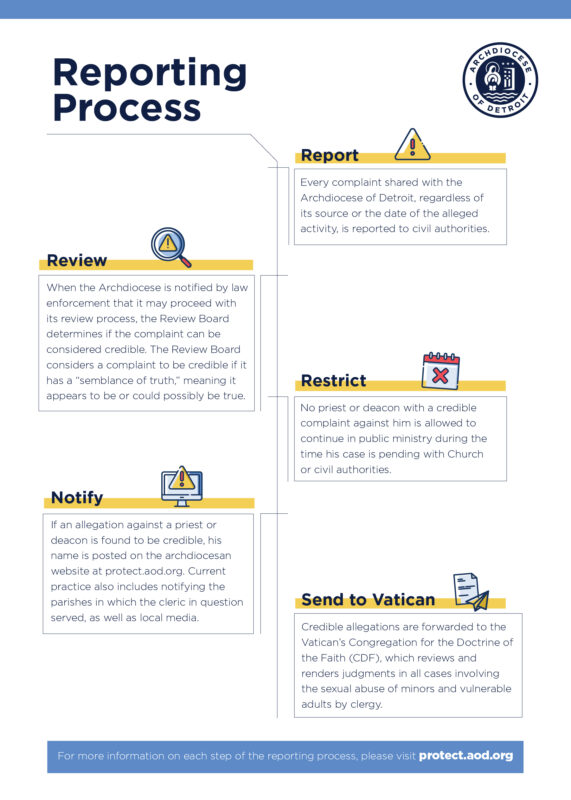(EspaГ±ol)
This year marks 20 years since the United States Conference of Catholic Bishops (USCCB) adopted the Charter for the Protection of Children and Young People, a comprehensive set of procedures and rules drafted to provide uniformity and accountability for dioceses addressing allegations of sexual abuse of minors and vulnerable adults by Catholic clergy. The Charter also includes guidelines for reconciliation, healing, accountability, and the prevention of future acts of abuse.
Commonly known as the “Dallas Charter” after the city in which it was drafted, this document established, for the first time, a set of uniform, “zero tolerance” procedures for all (arch)dioceses in the United States regarding the handling of sex-abuse allegations involving minors and vulnerable adults. It also required that all U.S. dioceses implement practices, such as universal criminal background checks and mandatory safe environment trainings, that would prevent abuse from occurring in the first place. The Charter is reviewed at least every seven years to ensure its practices are of the highest and most current standards.
The Charter was drafted during the 2002 spring general assembly of the USCCB. That meeting occurred amid a firestorm of nationwide reports regarding decades of child sexual abuse by Catholic priests. It was an immensely difficult time for the Church and her faithful as they faced the horror stories of crimes committed by those in positions of power and trust. It was a necessary cleansing—the spark to ignite critical discussion and transparent reform.
The process of implementing the Charter and assessing our progress in the Archdiocese of Detroit has been unceasing. Over the last two decades, we have trained tens of thousands of adults and children through safe environment programs, released a list of credibly accused clergy (updated as new allegations are made known to us), shared all case files and subsequent complaints with law enforcement, and published numerous messages from Archbishop Vigneron and others involved in the essential work of ensuring safety in our communities. We continue this commitment now, with this review issued in recognition of the upcoming 20th anniversary of the adoption of the Dallas Charter.
Focused through a local lens, an evaluation of the Charter’s impact over the last twenty years is both informative and illuminating. It provides, for all of us, an opportunity to review the learned experiences, adopted policies, and data accumulated over two decades. We see the importance of our unwavering commitment to victim-survivors, of Archbishop Vigneron’s open dialogue about clerical sexual abuse, and the absolute necessity of our ongoing cooperation with law enforcement.
What follows is a summary of the Archdiocese of Detroit’s implementation of the Dallas Charter and the resulting progress we have made in the areas of prevention, accountability, and healing.
Prevalence of Abuse
National research on clerical sexual abuse consistently identifies the years 1974 to 1982 as the peak period for such incidents in the United States. While public awareness has contributed to a significant increase in reportsВ in recent years, the majority of those reports concern abuse from past decades; reports of contemporary abuse are uncommon. Local data supports this conclusion: In total, there have been 81 clerics credibly accused of abuse in the Archdiocese of Detroit since 1950, representing roughly 2.12 percent of all clergy (3,826 priests and deacons, including those from religious orders) who have served in the Archdiocese of Detroit during the same time.* Two of those individuals were linked to abuse that occurred in the last twenty years, both in the early 2000s.
This data confirms and emphasizes the Church’s responsibility to respond compassionately and effectively to all abuse allegations, even those involving accounts of abuse that occurred many years ago.
*Corrected in October 2022
Safe Environment Programs
The decrease of abuse in Catholic communities cannot be attributed to any one cause. Over the last 20 years, the introduction of mandatory, universal criminal background checks for all Church representatives and volunteers, and our adherence to mandatory reporting laws in Michigan, have made an impact. So, too, have other policies and practices we’ve put into place. Among the most important are the safe environment programs, mandated by the Dallas Charter, that have equipped an entire population of people – children, parents, teachers, coaches, volunteers, clergy, and others – to identify and report potentially dangerous situations.
To date, the Archdiocese of Detroit has required and performed 413,461 criminal background checks on all priests, deacons, staff, and volunteers who work with children. In addition, more than 118,000 adults in southeast Michigan have participated in archdiocesan safe environment programs like Protecting God’s Children that both train individuals to identify and eliminate situations that enable sexual offenders and emphasize the critical steps that must be taken to prevent and report the sexual abuse of children and vulnerable adults. Each year 65,000 school-aged children in the Archdiocese participate in age-appropriate, personal safety programs. Combined, these training programs and criminal background checks make a tremendous contribution to the safety of all in our communities, filling our parishes, schools, and other ministries with tens-of-thousands of people who have been screened appropriately and equipped to protect themselves and the children in their care.
Cooperation with Law Enforcement
We recognize that despite every effort to eradicate abuse from our communities, we also must be prepared to respond swiftly and appropriately to allegations reported to the Archdiocese or law enforcement. While the Charter mandates that (arch)dioceses cooperate with civil officials, in 2002 the Archdiocese of Detroit went a step further and entered into voluntary partnerships with prosecutors from the six counties within the Archdiocese of Detroit to share all existing case files of clergy accused of sexual misconduct. Some of these complaints dated to the 1940s and 1950s. Also, as part of these agreements, we have shared with law enforcement every complaint that has come to us, regardless of its source, its contents, or the date of the alleged activity.
In addition, the Archdiocese shared these same files – and all subsequent complaints – with the Michigan Office of the Attorney General in response to that office’s investigation opened in the fall of 2018. Any civil investigation takes precedence; no Church investigations begin until law enforcement gives the Archdiocese permission to proceed.
This approach has served us well. In March of this year, Michigan’s Attorney General told a committee of state lawmakers: “… we’ve seen great cooperation with the dioceses.”
Review Board
Once cleared to proceed by law enforcement, the Review Board of the Archdiocese of Detroit processes complaints of clerical sexual abuse involving children and vulnerable adults against priests and deacons. The Archdiocese of Detroit established its first “review board” in 1988, when it became one of the first dioceses to implement a policy on sexual abuse of minors by clergy. The adoption of the Dallas Charter in 2002 prompted the Archdiocese to reconstitute its Review Board into its current form—an advisory body to Archbishop Vigneron comprised of lay experts who are not employed by the diocese, and one pastor.
The overwhelming majority of the abuse complaints presented to the Review Board are “historical” cases – those reported long after the abuse occurred. Many of these allegations fall outside the civil statute of limitations, limiting any possible action by law enforcement. The Review Board is still able to act on behalf of the victim and wider community by recommending to Archbishop Vigneron that credibly accused priests be restricted from public ministry. Our diocese accepts, processes, reviews, and acts on all reports.
Transparency
If the Review Board finds a complaint to be credible – meaning it has a “semblance of truth”—that is, appears to be, or could even possibly be true—Archbishop Vigneron submits the investigation to the Vatican’s Dicastery for the Doctrine of the Faith (DDF), which reviews and renders judgments in all cases involving the sexual abuse of minors and vulnerable adults by clergy. While awaiting a ruling from the Vatican, the names of those credibly accused are posted on the archdiocesan website at protect.aod.org. The archdiocese has publicly posted the names of restricted and/or removed priests and deacons since 2002. Current practice also includes notifying the parishes in which the credibly accused priest or deacon served as well as local media.
Zero Tolerance
No priest or deacon with a credible complaint against him is allowed to continue in public ministry during the time his case is under review by the Church or civil authorities. The Archdiocese remains in contact with restricted clergy members. Those priests who are permanently removed from ministry after being found guilty by the Vatican are monitored by a retired parole officer to ensure that they remain in compliance with the conditions imposed upon them.В
Prayer and Promise for Victim-Survivors
Care for victim-survivors of clergy sexual abuse is of paramount importance to the Archdiocese of Detroit, from Archbishop Vigneron to each of the thousands of safe environment training participants. We recognize the deep trauma that occurs because of these experiences. We recognize there are victim-survivors still hesitant to come forward. No matter how long it has been, no matter what occurred or who was involved, the Archdiocese of Detroit is waiting, ready to listen and to be of assistance. We will not waiver in our commitment to walk with you, to accompany you, and assist you in your journey toward justice, healing, and well-being.
Each meeting of the Review Board begins with a prayer first used in 2011 by the Archbishop of Dublin. I conclude by sharing that prayer with you:
Lord,
We are so sorry
for what some of us did to your children:
treated them so cruelly,
especially in their hour of need.
We have left them with a lifelong suffering.
This was not your plan for them or us.
Please help us to help them.
Guide us, Lord.
Amen.
Respectfully,
Michigan Court of Appeals Judge Michael J. Talbot (Ret.)
Chair, Archdiocesan Review Board
Individuals with knowledge of sexual abuse by clergy or other Church representatives are urged to contact local law enforcement and/or the Michigan Attorney General’s Office at (844) 324-3374 or aginvestigations@michigan.gov.
Individuals also may contact the Archdiocese of Detroit by visiting protect.aod.org or by calling the 24/7 victim assistance line at (866) 343-8055 or by emailing vac@aod.org. There are no time limits or restrictions on individuals wishing to report abuse.
For more information on the Archdiocese of Detroit’s response to abuse and commitment to preventing future incidents from occurring in our communities, please visit protect.aod.org.



